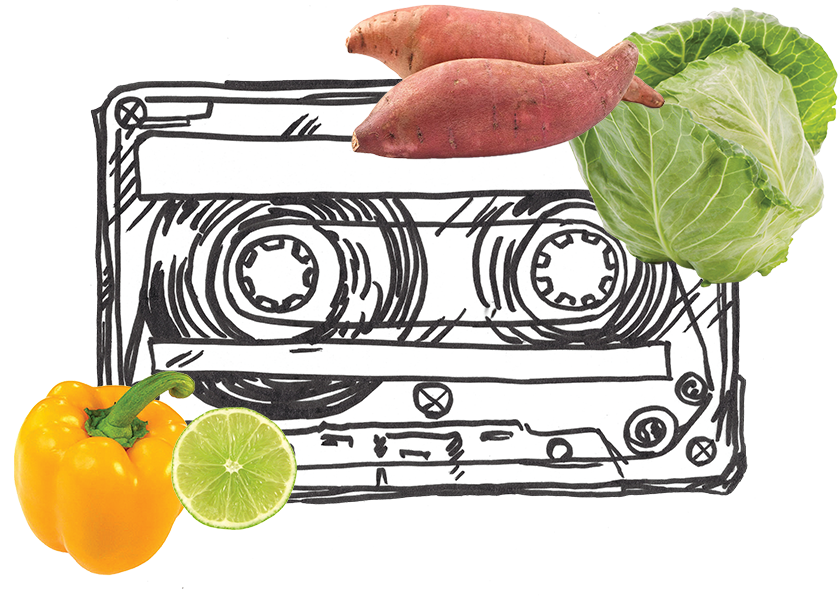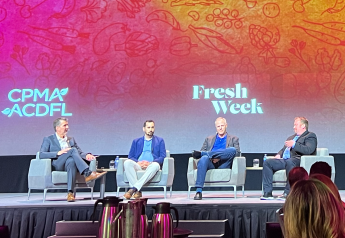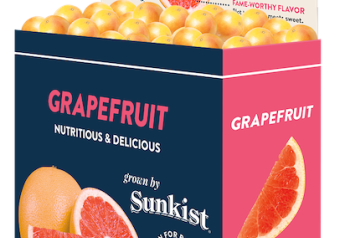Our top 5 produce retail trends for 2023

Going retro is trendy basically always, so let’s first rewind.
(Hey, Gen Xers and older: Remember watching the black cassette-tape ribbon literally rewind, like coil back from the right side to the left?)
Looking back on PMG’s top five produce-retail predictions for 2022, we got a lot right, and one, well ... not so much.
- Companies will implement more sustainable practices and share about it more effectively. (Check.)
- Mushrooms. They still got it for plant-forward, less-processed-focused consumers. It’s the better way to make a meatless burger, Bolognese or taco. (Check.)
- The influence of social media will grow. TikTok viral recipes are no joke. (Check.)
- QR codes become more mainstream, accepted and utilized. (Check.)
- Branded produce. Could we have predicted how much price inflation would keep rising? Unclear. But consumers with smaller budgets started seeking value, which sometimes means less expensive private labels, or store brands. (Errrr. Needs review.)
We have no problem not always being right, even if — ahem — we usually are. And anyway, being open-minded to change, willing to admit errors and course-correct is a highly valued skill in the fast-paced, unpredictable perishable produce industry.
So, as we all talk, buy, sell and promote to each other in 2023, we look forward to what’s next in the industry.
“The great thing about produce is you think you've seen it all, and then you are surprised," said Peter Collis, produce buyer for FreshPro Food Distributors, West Caldwell, N.J.
To see if we could anticipate those surprises (then it’s not a surprise, is it?), we studied the predictions announced by Baldor Specialty Foods, FreshDirect, The Fresh Market, Whole Foods Market, Food Network, Forbes, FoodMix Marketing Communications and Fairtrade America.
These are some common threads among the 2023 prediction lists:
> Regenerative agriculture and regenivores
A leap further than organic and more specific than sustainable agriculture, regenerative agriculture will be the one to watch, suggest at least four of these lists. The nonprofit Regeneration International says regenerative agriculture means farming and grazing practices that, among other benefits, reverse climate change by rebuilding soil organic matter and restoring degraded soil biodiversity — resulting in both carbon drawdown and improving the water cycle. The consumer will be identifying as a “regenivore,” rather than a “climavore,” The New York Times said. Then again, International Fresh Produce Association CEO Cathy Burns predicted the emergence of the “pegan” diet, a blend of Paleo and vegan diets comprising 75% plant-based food and 25% sustainable animal products.
> Climate-conscious consumer
By all means, if your company is doing anything considered regenerative agriculture or environmentally sustainable, you better share it with consumers effectively, so you rope in and retain those shoppers, like we said in 2022. Reducing or eliminating waste is a big thing in New York City, said Philip A. Penta, co-owner with Claudia and Javier Gonzalez of 3 Guys from Brooklyn, a 24-hour fixed open-air produce market, wholesale produce and grocery store. “I don’t have any wet waste because of the bio machines here, and the only byproduct is water. Our waste bill used to be $1,300. Now, my waste bill is zero. It’s really cool. I don’t know why more people aren’t doing it.” Considering 85% of the store’s inventory is fresh produce, that’s a big deal. We hope his shoppers know it.
> Private labels
With all the inflationary pressures for retailers as well as consumers, store brands will be pushed and sought more. It’s all about value these coming days, which don’t hold the most rosy economic promise, for this year at least. Albertsons Cos. and SpartanNash expanded their private label fresh-produce lines, and Lidl just launched one, for a few examples.
> More global flavors
You’ve probably heard this before, but it’s continuing, with a twist. Mexican cuisine is hardly considered global now. It’s simply a comfort food in the U.S. Growing in popularity in the global arena are the dishes and ingredients popular in the Eastern Mediterranean, countries such as Turkey, Syria, Israel, Palestine, Iraq, Egypt, Morocco, Tunisia, Somalia and Sudan. But also almost everywhere. Suggest recipes and merchandise accordingly.
> Nostalgic eating
With all the uncertainties of the lingering pandemic, Russian-Ukraine war, messy politics and glum economy, shoppers and diners crave something safe, familiar and steadfast. Like your mother’s meatloaf, green beans and mashed potatoes (or is that just me?). Marketers must conjure those feelings and experiences in consumers. What’s nostalgic differs for each person, so it could be produce-filled dishes from the 1950s or 1990s. It could be Midwestern food, since everyone fled the urban coastal cities during the pandemic, or it could be SoCal food, if that’s your zip code.
Bonus
These annual lists often contain a single ingredient — a fruit or vegetable that’s going to be as hot as the avocado. Success rates of these specific-produce predictions are quite mixed. But it could happen. Or continue to happen (looking at you, mushroom). They’re naming ube, dates, kelp, Persian cucumbers, tamarind, fingerling potatoes, microgreens, little gem lettuce and velvet apricots. We shall see.







